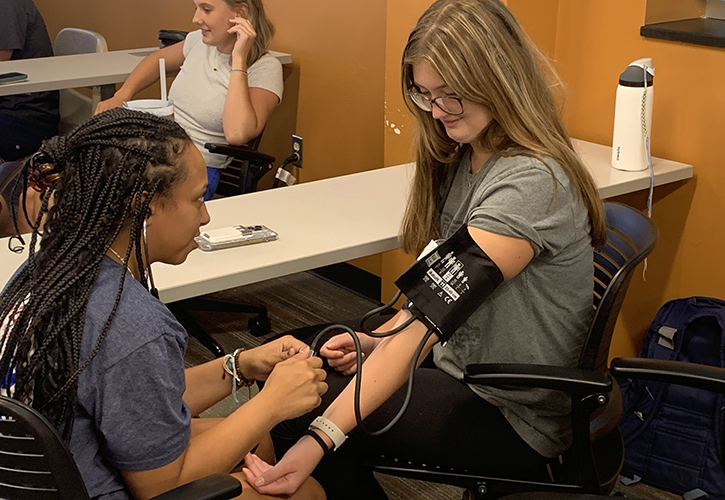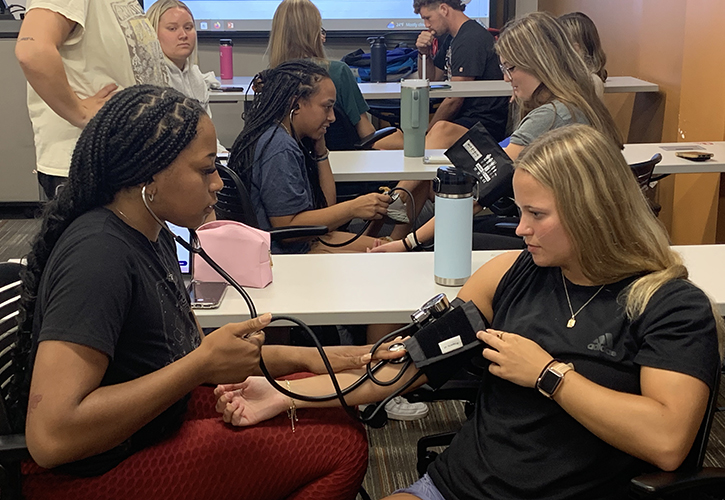College of Arts and Sciences Newsroom

Pre-Health Resource Center guides students from all majors to health profession careers
By Dave Larsen
University of Dayton students interested in attending a health professional school after graduation can get help navigating their path to acceptance through UD’s Pre-Health Resource Center.
Formerly known as the Premedical Programs Office, the center rebranded this fall to expand its services to students beyond traditional pre-medicine and pre-dentistry majors, to also include majors in health and natural sciences.
The center provides targeted academic advising, career exploration, experiential learning opportunities and preparation for professional school application for students of any major who are considering careers as a dentist, physician assistant, veterinarian, pharmacist, optometrist, podiatrist, chiropractor, or physical or occupational therapist, among others.
According to student feedback, the center’s previous name made some students feel like it wasn’t a place for them, said Elizabeth Rhoads, Premedical Programs director and senior lecturer in biology.
“We are serving students beyond just the premed major, including those who are majoring in biology, biochemistry or health science,” Rhoads said. “If they are planning to apply to a health professional school, they can turn to us for advising and resources.”
Rhoads said the expansion is the product of increased participation between the College of Arts and Sciences and the School of Education and Health Sciences, recognizing the growing number of pre-health students on campus.
This year, the College has 288 pre-medicine and pre-dentistry majors, including 76 first-year students. The School of Education and Health Sciences has 391 students majoring in health science, including 85 first-year students.

“We believe having a central location for information about career opportunities in the health professions, as well as information about different pathways to those professions, will benefit our students in health science, as well as students in other health-focused majors,” said Sabrina Neeley, associate dean for clinical, global and experiential learning in the School of Education and Health Sciences, and an associate professor in the Health and Sport Science Department.
Graduate student-athlete Katie Reeg ’23 is currently applying to medical school as a non-traditional major. A catcher on UD’s softball team, Reeg received a bachelor’s degree in applied mathematical economics in May. She had one year of eligibility left, so she stayed at UD to pursue a Master of Business Analytics degree from the School of Business Administration, which she will complete in June 2024.
Reeg has met with Rhoads during the last 2 1/2 years for advice about the medical school application process, course requirements and MCAT preparation.
“As a student in the mathematics department, I needed a lot of guidance through the medical school application process,” said Reeg, of Overland Park, Kansas. “Dr. Rhoads and her team have been extremely helpful in my application process as an applicant with a non-traditional undergraduate degree. I don't know what I would have done without their help.”
To serve additional students, the center hired Kate Chesar in March as pre-health experiential learning coordinator, a new staff position. She helps students secure clinical, research, community health and professional shadowing experiences to give them valuable experience for their applications.
“I’m excited to start tying in more community partnerships with the pre-health majors to expand students’ ability to have different kinds of experiences in the health care field,” Chesar said.
On Friday, Oct. 20, the center will host a pre-health majors fair in Kennedy Union, where first-year students can meet with representatives from the University’s health and natural science departments to learn more about their programs and majors. The event also will target students in the Discover Sciences, Discover Arts and Discover Health and Medicine programs, which allow students to explore all academic options at UD, while keeping them on track to graduate in four years.
In addition, the center is expanding its annual seminar series, in which medical and dental school representatives visit campus to give presentations to UD students. The 2023-24 seminar series also includes speakers from physician assistant, anesthesia, osteopathic, podiatric, optometry, community medicine, and physical and occupational therapy programs.
“We see this as a vocational discernment opportunity for students,” Rhoads said. “We are trying to make sure our pre-health students get into the major that’s the best fit for them and also figure out what type of health care profession they really want to go into. Do they want to become a physician, or maybe they would love occupational therapy, podiatry or whatever it might be. We’re trying to expose them to the array of professions in health care.”
For more information, visit the Pre-Health Resource Center website.
